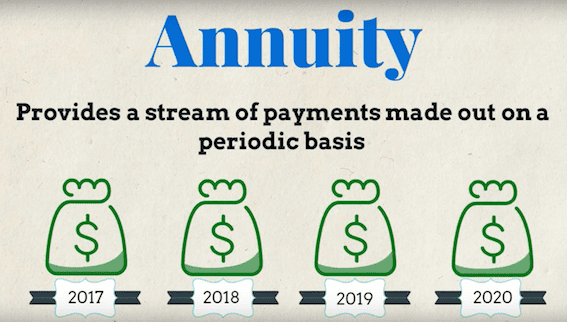An Annuity provides a stream of payments made out periodically. An annuity consists of a fixed sum of money that somebody receives annually or monthly. The payments continue regularly over a long period. In fact, in many cases, the annuity pays out for the rest of a person’s life.
An annuity is a contract that an insurer issues. The consumer either pays an original lump sum or makes a series of payments. The insurance company designs the arrangement so that the funds grow over time.
The insurance company guarantees to either make payments periodically or at a future date.
Annuities are one of the main means of securing steady cash flow for people when they enter retirement. People save up in their pension pot into a monthly or annual retirement income. They aim to live on that income when they retire. The annuity is the result of all the payments that the consumer made.
Annuities can also be structured to payout for a fixed period or to cover both the annuitant’s life and that of a surviving spouse or heir through joint and survivorship options.
Annuity – private pensions
In the private pension industry, experts say that an annuity is an insurance contract. The insurance company, in the contract, insures the policyholder against living too long.
In return for a lump sum, the annuity provider gives policyholders an annual income for the rest of their lives. The annuity provider is an insurance company.
An annuity is marvelous if the individual lives a long life and can take advantage of the income. However, for those that die earlier, the arrangement is less advantageous.
If you die relatively young, you are more likely to have paid more toward your policy than you got back.
Annuities offer tax-deferred growth of earnings. Some of them even offer a death benefit that will pay a beneficiary a specified amount.
Although tax is deferred on earnings growth, you pay ordinary tax rates on the money the annuity pays you.
The three main types of annuities
1. Fixed annuities
Insurance companies pay you a specific rate of interest while the account is growing. You receive a specific amount of money periodically.
The payments may continue either for a definite or indefinite period. ‘Indefinite’ in this context means ‘for the rest of your life.’
2. Indexed annuities
This type of annuity is credited with a return which the insurer links to the performance of a certain index. An example of an index is the S&P 500 Composite Stock Price Index.
However, the insurance company guarantees that the value of the contract will be no less than a specified minimum. The insurer guarantees this minimum, regardless of how badly the index might perform.
3. Variable annuities
In this contract, policyholders may choose how to invest their purchase payments. There are several different investment options. In most cases, they are different types of mutual funds.
The rate of return and how big the payments are depend on the performance of the investments. Namely, the investments that the policyholders picked.
To mitigate investment risk, some variable annuities offer a guaranteed minimum income benefit, ensuring a consistent payment level despite investment performance fluctuations.
Furthermore, annuity contracts can include riders that provide enhanced benefits, such as cost-of-living adjustments to account for inflation over the annuity’s payout period.
Video explanation – What is an Annuity?
This video, from our YouTube partner channel – Marketing Business Network, explains what “Annuity” means using simple and easy-to-understand language and examples.
